
P will be
Pd/BaSO4+H2
LiAlH4
NaBH4
Pd+H2
The correct Answer is:A
Similar Questions
Two events A and B will be independent, if(A) A and B are mutually exclusive(B) P(A'∩B')=[1−P(A)][1−P(B)](C) P(A)=P(B) (D) P(A)+P(B)=1
View SolutionAssertion : Two identical bulbs when connected across a battery, produce a total power P. When they are connected across the same battery in series total power consumed will be P4.
Reason : In parallel, P=P1+P2 and in series P=P1P2P1+P2
View Solution
Knowledge Check
If A and B be independent events with P(A)=14and(P(A∪B)=2P(B)−P(A) , then P(B) is equal to
A25B15C35DNone of these
If the sum of P terms of an A.P. is q and the sum of q terms is p , then the sum of p+q terms will be
(a) 0
(b) p−q
(c) p+q
(d) (p+q)
View SolutionIn a P4 molecule, the P – P – P bond angle is :
View SolutionIf P is a two-rowed matrix satisfying P'=P−1, then P can be
View SolutionIf P = {2, 3}, then P×P is equal to
View SolutionP - P - P bond angle in white phosphorous is
View SolutionLet A and B be two events such that P(A∪B)=P(A∩B). Then,
Statement-1: P(A∩¯¯¯B)=P(¯¯¯A∩B)=0
Statement-2: P(A)+P(B)=1
View SolutionThe proposition (p→~p)∧(~p→p) is a
View Solution

